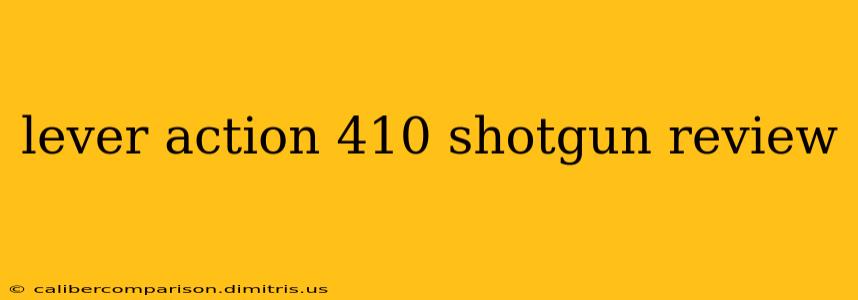The .410 bore lever-action shotgun is a niche market, appealing to a specific type of shooter. While not as common as pump-action or semi-automatic shotguns, its unique charm and functionality attract many. This review will delve into the pros and cons of this interesting firearm, focusing on its practicality, reliability, and overall shooting experience. We'll consider various models and address common questions to help you decide if a lever-action .410 is right for you.
What Makes a Lever-Action .410 Unique?
The lever-action mechanism, famously associated with rifles like the Winchester, offers a distinct shooting experience. Unlike pump-actions that require a forward and backward motion, the lever-action operates with a simple side-mounted lever. This allows for relatively quick follow-up shots, especially when compared to single-shot .410 shotguns. The lever's action is generally smooth and intuitive, making it a preferred choice for some shooters. The compact design also makes it appealing for close-quarters situations and home defense, although the .410's relatively low stopping power should be considered.
Advantages of Lever-Action .410 Shotguns
- Compact and Maneuverable: Their smaller size compared to other shotguns makes them ideal for navigating tight spaces.
- Smooth, Intuitive Operation: The lever action generally feels natural and provides quick follow-up shots.
- Noticable Nostalgia Factor: The classic lever-action design holds a particular appeal for many shooters.
- Variety of Calibers (Sometimes): Some lever-action models may offer the option for different gauges or ammunition types. However, .410 is the primary caliber for this action type.
Disadvantages of Lever-Action .410 Shotguns
- Lower Capacity: Compared to pump-action or semi-automatic shotguns, lever-action .410s typically hold fewer shells.
- Limited Availability: Finding a wide selection of lever-action .410 shotguns can be more challenging than finding other shotgun styles.
- .410 Bore Limitations: The .410 bore itself has limitations in terms of stopping power and range compared to larger gauges like 12-gauge or 20-gauge. This is crucial to remember, particularly if considering it for home defense.
- Potential for Malfunctions (depending on the manufacturer): As with any firearm, quality control and maintenance are crucial for reliable performance. Thorough research of specific models is advised.
Factors to Consider When Choosing a Lever-Action .410
- Manufacturer and Reputation: Research different manufacturers and their reputation for quality and reliability.
- Overall Build Quality: Inspect the materials, finish, and overall construction of the shotgun before purchase.
- Ergonomics: Ensure the shotgun fits comfortably in your hands and allows for easy manipulation of the lever and trigger.
- Intended Use: Consider your intended use for the shotgun – hunting, home defense, target shooting – as this will influence your choice.
Conclusion: Is a Lever-Action .410 Right for You?
A lever-action .410 shotgun is a specialized firearm. Its charm lies in its compact design, smooth action, and classic aesthetics. However, the limited capacity, .410's inherent limitations, and sometimes lower availability mean it isn't for everyone. Thorough research, considering individual needs and shooting experience, is essential before purchasing. If you value a compact, uniquely styled shotgun for specific applications like small-game hunting or close-range pest control, a lever-action .410 might be a worthwhile addition to your collection. However, for home defense or situations requiring greater stopping power, a larger-gauge shotgun may be a more suitable option. Remember to always practice safe gun handling and adhere to local laws and regulations.

